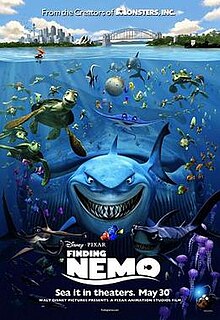Our website is made possible by displaying online advertisements to our visitors.
Please consider supporting us by disabling your ad blocker.
Finding Nemo
| Finding Nemo | |
|---|---|
 Theatrical release poster | |
| Directed by | Andrew Stanton |
| Screenplay by |
|
| Story by | Andrew Stanton |
| Produced by | Graham Walters |
| Starring | |
| Cinematography |
|
| Edited by | David Ian Salter |
| Music by | Thomas Newman |
Production company | |
| Distributed by | Buena Vista Pictures Distribution[a] |
Release dates |
|
Running time | 100 minutes[1] |
| Country | United States |
| Language | English |
| Budget | $94 million[1] |
| Box office | $940.3 million[1] |
Finding Nemo is a 2003 American animated comedy-drama adventure film[2] produced by Pixar Animation Studios for Walt Disney Pictures. The film was directed by Andrew Stanton, co-directed by Lee Unkrich, and produced by Graham Walters, from a screenplay written by Stanton, Bob Peterson, and David Reynolds, based on a story by Stanton. The film stars the voices of Albert Brooks, Ellen DeGeneres, Alexander Gould, Willem Dafoe, and Geoffrey Rush. It tells the story of an overprotective clownfish named Marlin (Brooks) who, along with a forgetful regal blue tang named Dory (DeGeneres), searches for his missing son Nemo (Gould). Along the way, Marlin learns to take risks and comes to terms with Nemo taking care of himself.
Pre-production of the film began in 1997. The inspiration for Finding Nemo sprang from multiple experiences, going back to Stanton's childhood, when he loved going to the dentist to see the fish tank, assuming that the fish were from the ocean and wanted to go home. To ensure that the movements of the fish in the film were believable, the animators took a crash course in fish biology and oceanography. Thomas Newman composed the score for the film.
First premiering at the El Capitan Theatre in Los Angeles on May 18, Finding Nemo was released in theaters in the United States on May 30. Upon its release, it received widespread acclaim from critics, who praised the visual elements, screenplay, animation, Newman's score and characters that have been cited as funny to both young moviegoers and their parents.[3] It became the highest-grossing animated film at the time of its release, and the second-highest-grossing film of 2003, earning a total of $871 million worldwide by the end of its initial theatrical run.[4] The film received four nominations at the 76th Academy Awards, and won the award for Best Animated Feature, becoming the first Pixar film to do so.
Finding Nemo is the best-selling DVD title of all time, with over 40 million copies sold as of 2006[update],[5] and was the highest-grossing G-rated film of all time before Pixar's own Toy Story 3 overtook it. The film was re-released in 3D in 2012. In 2008, the American Film Institute named it as the 10th greatest American animated film as part of their 10 Top 10 lists.[6] A sequel, Finding Dory, was released in June 2016.
Cite error: There are <ref group=lower-alpha> tags or {{efn}} templates on this page, but the references will not show without a {{reflist|group=lower-alpha}} template or {{notelist}} template (see the help page).
- ^ a b c "Finding Nemo (2003)". Box Office Mojo. Archived from the original on July 31, 2012. Retrieved January 11, 2014.
- ^ "Finding Nemo (2003)". American Film Institute. Archived from the original on July 27, 2022. Retrieved July 27, 2022.
- ^ Fetters, Ashley (May 10, 2013). "10 Years Ago, Finding Nemo Was Disappointing by Pixar Standards". The Atlantic. Archived from the original on December 29, 2021. Retrieved December 29, 2021.
- ^ "Finding Nemo (2003)". Box Office Mojo. Archived from the original on August 31, 2012.
- ^ Boone, Louis E. (2006). Contemporary Business 2006. Thomson South-Western. p. 4 –. ISBN 0-324-32089-2.
- ^ Cite error: The named reference
AFITop10was invoked but never defined (see the help page).
Previous Page Next Page


